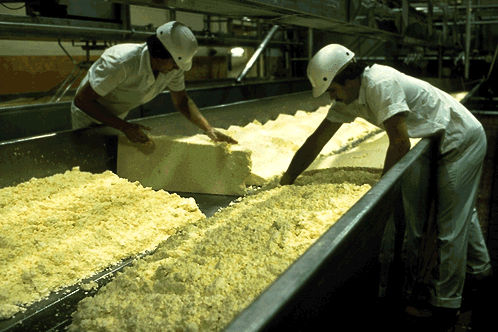Browse "Business & Economics"
-
Article
Carbon Pricing in Canada
Carbon pricing refers to a cost that is imposed on the combustion of fossil fuels used by industry and consumers. Pricing can be set either directly through a carbon tax or indirectly through a cap-and-trade market system. A price on carbon is intended to capture the public costs of greenhouse gas (GHG) emissions and shift the burden for damage back to the original emitters, compelling them to reduce emissions. In 2016, Prime Minister Justin Trudeau announced a national climate change policy that includes a system of carbon pricing across Canada. Provinces can either create their own systems to meet federal requirements or have a federal carbon tax imposed on them. Nine provinces and territories have their own carbon pricing plans that meet federal requirements. Ottawa has imposed its own carbon tax in Alberta, Saskatchewan, Manitoba and Ontario.
"https://d2ttikhf7xbzbs.cloudfront.net/media/media/b5692090-6383-4206-ad1f-d44cef8427bf.jpg" // resources/views/front/categories/view.blade.php
https://d2ttikhf7xbzbs.cloudfront.net/media/media/b5692090-6383-4206-ad1f-d44cef8427bf.jpg
-
Article
Career Counselling
One of the major responsibilities of schools is to prepare students for employment and one of the ways they achieve this is through career counselling.
"https://development.thecanadianencyclopedia.ca/images/tce_placeholder.jpg?v=e9dca980c9bdb3aa11e832e7ea94f5d9" // resources/views/front/categories/view.blade.php
https://development.thecanadianencyclopedia.ca/images/tce_placeholder.jpg?v=e9dca980c9bdb3aa11e832e7ea94f5d9
-
Article
Career counselling
Career counselling. Musically talented children wishing to study music seriously usually receive counselling from their music teachers, both private and school.
"https://development.thecanadianencyclopedia.ca/images/tce_placeholder.jpg?v=e9dca980c9bdb3aa11e832e7ea94f5d9" // resources/views/front/categories/view.blade.php
https://development.thecanadianencyclopedia.ca/images/tce_placeholder.jpg?v=e9dca980c9bdb3aa11e832e7ea94f5d9
-
Article
C.D. Howe Institute
The C.D. Howe Institute (formerly the Howe Research Institute), is a nonprofit policy research organization established in 1973 by a merger of the Private Planning Association of Canada, formed in 1958, and the C.D. Howe Memorial Foundation. It is located in Toronto.
"https://development.thecanadianencyclopedia.ca/images/tce_placeholder.jpg?v=e9dca980c9bdb3aa11e832e7ea94f5d9" // resources/views/front/categories/view.blade.php
https://development.thecanadianencyclopedia.ca/images/tce_placeholder.jpg?v=e9dca980c9bdb3aa11e832e7ea94f5d9
-
Macleans
Celtic Tiger
In Ireland, where the price of a pint is often a measure of prosperity, there is no greater gauge of the prevailing public mood than O'Donnell's pub.This article was originally published in Maclean's Magazine on August 21, 2000
"https://development.thecanadianencyclopedia.ca/images/tce_placeholder.jpg?v=e9dca980c9bdb3aa11e832e7ea94f5d9" // resources/views/front/categories/view.blade.php
https://development.thecanadianencyclopedia.ca/images/tce_placeholder.jpg?v=e9dca980c9bdb3aa11e832e7ea94f5d9
-
Article
Cement Industry
The Cement industry comprises establishments engaged in producing hydraulic cements, ie, cements which set and harden to a stonelike mass by reacting with water. The principal hydraulic cement is portland cement, a finely ground, usually grey, manufactured mineral product.
"https://development.thecanadianencyclopedia.ca/images/tce_placeholder.jpg?v=e9dca980c9bdb3aa11e832e7ea94f5d9" // resources/views/front/categories/view.blade.php
https://development.thecanadianencyclopedia.ca/images/tce_placeholder.jpg?v=e9dca980c9bdb3aa11e832e7ea94f5d9
-
Article
Chamber of Commerce
Chamber of Commerce, a nonprofit organization of business people and corporations established to promote economic development and collectively represent their concerns to government on public policy.
"https://development.thecanadianencyclopedia.ca/images/tce_placeholder.jpg?v=e9dca980c9bdb3aa11e832e7ea94f5d9" // resources/views/front/categories/view.blade.php
https://development.thecanadianencyclopedia.ca/images/tce_placeholder.jpg?v=e9dca980c9bdb3aa11e832e7ea94f5d9
-
Macleans
Chapters Bid
Inside the Toronto mansion of Heather Reisman and Gerry Schwartz, venue of glittering parties featuring Canada's cultural and political elite, the library is one of the most popular rooms. In among the shelves of literature, art books and countless tomes by Winston Churchill and about John F.This article was originally published in Maclean's Magazine on December 11, 2000
"https://development.thecanadianencyclopedia.ca/images/tce_placeholder.jpg?v=e9dca980c9bdb3aa11e832e7ea94f5d9" // resources/views/front/categories/view.blade.php
https://development.thecanadianencyclopedia.ca/images/tce_placeholder.jpg?v=e9dca980c9bdb3aa11e832e7ea94f5d9
-
Macleans
Chapters Struggles to Survive
It was a feat of magic befitting Harry Potter. In early July, Allan MacDougall, the head of Vancouver's Raincoast Books, was in the same jam as most Canadian publishers. Collectively, they were owed tens of millions of dollars in back payments by gigantic bookstore chain Chapters Inc.This article was originally published in Maclean's Magazine on August 14, 2000
"https://development.thecanadianencyclopedia.ca/images/tce_placeholder.jpg?v=e9dca980c9bdb3aa11e832e7ea94f5d9" // resources/views/front/categories/view.blade.php
https://development.thecanadianencyclopedia.ca/images/tce_placeholder.jpg?v=e9dca980c9bdb3aa11e832e7ea94f5d9
-
Article
Charities
There are more than 75 000 charities in Canada. They range in size from low-budget, neighbourhood-centred Meals on Wheels services to national healthcare and educational institutions with budgets of almost $1 billion. The majority of registered charities, some 40%, are places of worship.
"https://development.thecanadianencyclopedia.ca/images/tce_placeholder.jpg?v=e9dca980c9bdb3aa11e832e7ea94f5d9" // resources/views/front/categories/view.blade.php
https://development.thecanadianencyclopedia.ca/images/tce_placeholder.jpg?v=e9dca980c9bdb3aa11e832e7ea94f5d9
-
Article
Chartered Banks in Canada
Chartered banks, sometimes known as commercial banks, are public corporations that are licensed by the federal government to operate a banking business within Canada (see Banking in Canada). By issuing these licenses (or charters), the Canadian government regulates and controls the country’s economy by influencing the amount, availability and distribution of money, and the terms or cost of accessing and distributing that money (interest rates). Chartered banks are regulated by the federal Bank Act and supervised by the Office of the Superintendent of Financial Institutions. Chartered banks in Canada accept deposits from the public and extend loans (such as mortgages) for personal, commercial, and other purposes. Banks also own and operate trust companies, securities dealers and insurance companies and offer such services as investment banking, international banking and more.
"https://d2ttikhf7xbzbs.cloudfront.net/media/media/e10ef17b-47be-467b-be0a-c69c2b7d62d2.jpg" // resources/views/front/categories/view.blade.php
https://d2ttikhf7xbzbs.cloudfront.net/media/media/e10ef17b-47be-467b-be0a-c69c2b7d62d2.jpg
-
Article
Cheese and Cheese Making
In Canada, 408,197 tonnes of cheese were produced in 2012; per capita consumption was 12.18 kg, consisting of 3.9 kg of cheddar, 7.54 kg of mozzarella and other specialty cheeses, and 0.74 kg of cottage cheese.
"https://d2ttikhf7xbzbs.cloudfront.net/media/media/30e71a21-76ef-49e2-8af0-a655ed30b042.jpg" // resources/views/front/categories/view.blade.php
https://d2ttikhf7xbzbs.cloudfront.net/media/media/30e71a21-76ef-49e2-8af0-a655ed30b042.jpg
-
Article
Chemical and Chemical Products Industries
Chemical manufacturing entails the conversion of one material to another by a chemical reaction on a commercial scale. The starting material (feedstock) can be a natural substance or a relatively pure chemical used as an "intermediate" for subsequent upgrading.
"https://development.thecanadianencyclopedia.ca/images/tce_placeholder.jpg?v=e9dca980c9bdb3aa11e832e7ea94f5d9" // resources/views/front/categories/view.blade.php
https://development.thecanadianencyclopedia.ca/images/tce_placeholder.jpg?v=e9dca980c9bdb3aa11e832e7ea94f5d9
-
Article
Child Labour
Child labour is defined as the regular employment of boys and girls under the age of 15 or 16. Attitudes toward child labour have altered dramatically since the late 18th century, when it was generally assumed that children should contribute to the family economy from about age seven. By the beginning of the 20th century most Canadian provinces had enacted labour legislation to restrict the employment of children.
"https://d2ttikhf7xbzbs.cloudfront.net/media/media/35ffe4df-edd2-457d-85c5-aed95daeeb4e.jpg" // resources/views/front/categories/view.blade.php
https://d2ttikhf7xbzbs.cloudfront.net/media/media/35ffe4df-edd2-457d-85c5-aed95daeeb4e.jpg
-
Article
CHUM Limited
CHUM Limited, controlled by Allan Waters, and headquartered in Toronto, is one of Canada's largest radio and television broadcasting holding companies.
"https://development.thecanadianencyclopedia.ca/images/tce_placeholder.jpg?v=e9dca980c9bdb3aa11e832e7ea94f5d9" // resources/views/front/categories/view.blade.php
https://development.thecanadianencyclopedia.ca/images/tce_placeholder.jpg?v=e9dca980c9bdb3aa11e832e7ea94f5d9
